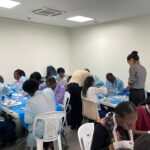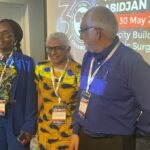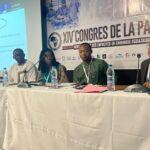Pan-African Paediatric Surgical Association (PAPSA) Biennial Congress
Contents
Location: Abidjan, Côte d’Ivoire
Dates: 26–31 May 2025
Attendee: Niyi Ade-Ajayi
Representing: British Association of Paediatric Surgeons (BAPS)
Roles: Member, Executive Council of PAPSA | Member, BAPS
-
Introduction and Context
I attended the Pan-African Paediatric Surgical Association (PAPSA) Congress and associated activities held in Abidjan, Côte d’Ivoire, from the 26th to 31st May 2025, as a representative of the British Association of Paediatric Surgeons (BAPS). I currently serve on the Executive Council of PAPSA and am an active member of the International Affairs Committee Advisory Group of BAPS. My participation was consistent with BAPS’ ongoing commitment to global surgical capacity building, particularly in Africa.
One of the key mandates of the International Affairs Committee was to support and run a Neonatal Surgery Workshop, specifically including a gastroschisis simulation training module—a high-priority area given its persistent high mortality in many low-resource settings. This initiative continues a long-standing collaboration between African paediatric surgeons and their UK counterparts, aimed at promoting sustainable skills transfer and improved patient outcomes.
-
Pre-Congress Neonatal Surgery Workshop (28th May 2025)
I arrived in Abidjan on Monday, 26 May 2025, aboard an Air France flight carrying 3 gastroschisis sim dolls (GABBY – T-model) with me. The next day (Tuesday, 27 May), final preparations for the workshop were completed by Miss Gerlin Naidoo and Mr. Haitham Daggash, in close collaboration with the local organising committee. The logistical setup, surgical materials (including biological and non-biological simulation tools), and course flow were all efficiently managed.
The full-day workshop on Wednesday, 28 May, focused on hands-on neonatal surgery simulation using chicken-based biological models, covering a wide range of essential neonatal procedures:
- Bowel anastomosis
- Creation and insertion of a gastrostomy
- Duodenal atresia repair
- Oesophageal atresia/tracheo-oesophageal fistula repair
The Course Director was Mr. Haitham Daggash. The faculty included:
- Prof. Kokila Lakhoo (Oxford)
- Miss Gerlin Naidoo (Kings / Oxford)
- Dr. Hope Glover Addy (Accra)
- Dr. Mohamed Salim (Dar es Salaam, Tanzania)
- Niyi Ade-Ajayi (Kings)
Of particular significance was the gastroschisis management simulation, coordinated by Dr. Mohamed Salim, supported by myself and others. This represented a turning point in the dissemination of low-cost, effective gastroschisis care strategies in Africa. Dr. Salim has emerged as a confident and skilled trainer, having previously benefited from BAPS-supported workshops and interventions. The fact that he now leads this work is a testament to the success of our sustainable mentoring model.
This was deeply gratifying, particularly given the measurable progress made in mortality reduction in centres such as Muhimbili National Hospital in Dar es Salaam, where gastroschisis mortality has dropped from over 90% to approximately 30% following years of investment in capacity building and collaborative research.
The workshop drew enthusiastic participation from trainees and consultants across Anglophone and Francophone Africa, with excellent feedback for the hands-on structure, faculty accessibility, and the pragmatic relevance of techniques taught.
-
Main PAPSA Congress Highlights (29–30 May)
The formal PAPSA Congress was held on Thursday and Friday, 29–30 May 2025, with a dynamic and diverse programme of academic and institutional activities.
Scientific Highlights
- The Heinz Rode Annual Lecture was delivered by Prof. Alaa El-Ghoneimi, focusing on three decades of minimally invasive paediatric urology, a thoughtful and inspiring reflection on progress in a technically challenging area.
- Prof. Kokila Lakhoo gave an outstanding summary of the history of PAPSA, charting the organisation’s origins, progress and the importance of leadership continuity and mentorship.
- Prof. Moafo Tambo presented a large series on Disorders of Sexual Differentiation (DSD). His team’s extensive experience provided a critical contribution to ongoing debates around best practices in managing DSD across complex socio-cultural contexts.
- A report on the first 100 paediatric laparoscopic procedures from Lagos was presented by Dr. Arua Igwe, showing the incremental but promising growth of minimally invasive paediatric surgery in West Africa.
- Notably, two back-to-back presentations from Kumasi and Accra examined potential links between mining activity and the incidence of gastroschisis—an important area of research with public health implications.
Organisational Developments
A key highlight of the Congress was the PAPSA Executive Council Meeting, attended by Prof. Kokila Lakhoo and myself. The Council is active and ambitious, with a clear strategic agenda. Of note:
- There is a strong push to include younger surgeons and medical students in PAPSA’s programmes.
- Plans for future joint training programmes and cross-institutional fellowships were discussed.
- The leadership under President Prof. Emmanuel Ameh and Secretary Dr. Milind Chitnis is committed to expanding international collaborations, including those with BAPS.
-
Conclusion and Recommendations
The Congress concluded with a gala dinner on Friday, 30 May, a joyful celebration of a successful congress, professional engagements and shared purpose in the interests of children who require surgical intervention. I returned to London on Saturday, 31 May 2025.
This meeting reaffirmed the value of sustained, structured collaboration between African paediatric surgical bodies and BAPS. The neonatal workshop, in particular, demonstrated how well-targeted simulation-based education—coupled with mentorship and local leadership—can produce durable, life-saving results.
Prof. Emmanuel Ameh, current PAPSA President and former Hugh Greenwood Fellow, asked that I extend his warm regards to the BAPS leadership. PAPSA hopes BAPS will continue to partner in future initiatives, particularly in the areas of:
- Joint workshops and simulation training
- Mutually beneficial trainee exchanges, with appropriate institutional support
- Strategic input from the BAPS Education and International Affairs Committees
Going forward, I strongly recommend that BAPS continue its support of PAPSA, especially as African units grow increasingly able to host UK trainees, further enriching global paediatric surgical education.




